I must first underline that Georgia would not have even had a chance at freedom without the heroic fight of the Ukrainians (and the Georgian fighters in Ukraine, of whom we are fiercely proud) – so, Slava Ukraini!
Georgia has been witnessing unprecedented protests triggered by the Foreign Agents law, popularly dubbed “the Russian law,” for more than a month.
Older generations believe that it is similar to the struggle for independence in the 1980s, but underline that this movement is even better in the sense that it is very decentralized and self-organized, as opposed to prominent leadership in the 1980s. Stereotypically, Georgians used to be known as people who needed a centralized command and to rally behind a “messiah” figure to protest, getting tired very easily and abandoning their specific objectives if they did not succeed very quickly.
We see that these protests are not only grassroots but also very enduring.
It should also be underlined that the law did not come out of nowhere. The public has increasingly been frustrated with the Georgian Dream’s soft stance towards Russia and anti-Western and anti-Ukrainian rhetoric. Their mass unmasking began after they had already captured state institutions when Russia launched its full-scale invasion of Ukraine in 2022.
Protests against the bill is a struggle for independence and European identity
In May 2024, it became known that the Parliament of Serbia will likely also be discussing a similar law closely based on the Georgian version.
Protesters won against the first attempts to introduce the law in 2023. However, Georgia reintroduced it one day after the Kyrgyz President signed a very similar Foreign Agents bill into law on 2 April 2024.
For this reason, the latter part of the article will address the global big picture of the Foreign Agent laws – how they suffocated freedom in Russia, how Russia marks its territory of influence with this law, why several countries pursuing it concurrently is no coincidence, and why we should expect the spreading of it as a menace if the people of Georgia are not victorious.
The Georgian protests and the historical background of modern Georgia have been, to a degree, covered by the international media.
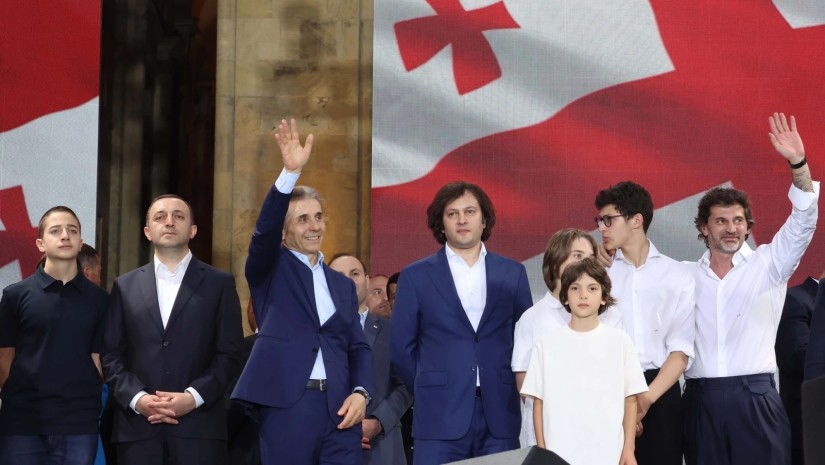
Russian-made oligarch Bidzina Ivanishvili’s 29 April speech has been perceived as a decisive turn away from the West.
He also underlined that Georgia is not the Ukraine of Yanukovych, unseated by the Euromaidan protests of 2013-2014, implying it is not possible to get rid of him by popular uprising.
But even despite such an open declaration of inherent hostility towards civil society, the government propaganda still insists it is all about “transparency.”
There still is persistent disinformation coming from Russian and Georgian government sources about the content of the law, and even well-wishers of Georgia are sometimes misled to think that the law itself is “not that big of a deal,” potentially creating a false sense of overreaction by the Georgian society or diverting people’s attention away from assessing the process as what it truly is: a fundamental, nation-wide struggle not just democracy, freedom, and European identity, but also for very independence as a nation.
Indeed, for an increasing number of Georgians and friends of Georgia, it feels like the country is losing its independence to Russia. This is because a Georgia isolated from the West is a lone Georgia, alone in the face of the non-existent Russian mercy, in which case Russia can always end Georgia’s very existence on the map whenever it pleases. Georgia is a small country of 3.7 million, and Russia already has its occupying army stationed 40 kilometers away from Tbilisi, the national capital.
It is also important to equip friends of Georgia with specific arguments on why the law is draconian.
Thus, let us first dive deeper into why this law would suffocate all civic freedoms in Georgia and, by extension, make Georgia’s partnership with the West impossible, isolate the country, and leave it prey to Russia.
Why the Georgian Foreign Agent law is not similar to the US FARA
First of all, let’s debunk the most common propaganda myth that Georgia’s Foreign Agents bill copies the Foreign Agents Registration Act (FARA) of the United States. In a purposefully written article, Ted Jonas underlines that FARA is fundamentally about lobbying organizations that serve the interests of states hostile to the United States and do not concern most areas of life, such as sciences, arts, academia, humanitarian organizations, etc.
It is also noteworthy that in the United States, being a country of common law, judges are more flexible in decision-making. Georgia, on the other hand, is a country of civil law, where anything written down in a legal document is inflexibly binding for a judge.
In addition, the Foreign Agents bill concerns all non-governmental, non-commercial organizations that receive at least 20% of foreign funding from abroad. It only excludes sports organizations and organizations importing blood. The law does not distinguish between friendly and hostile nations.
Note: the law was secretly amended before the third vote, and it now extends to individuals as well, which will be discussed at the end of the article.
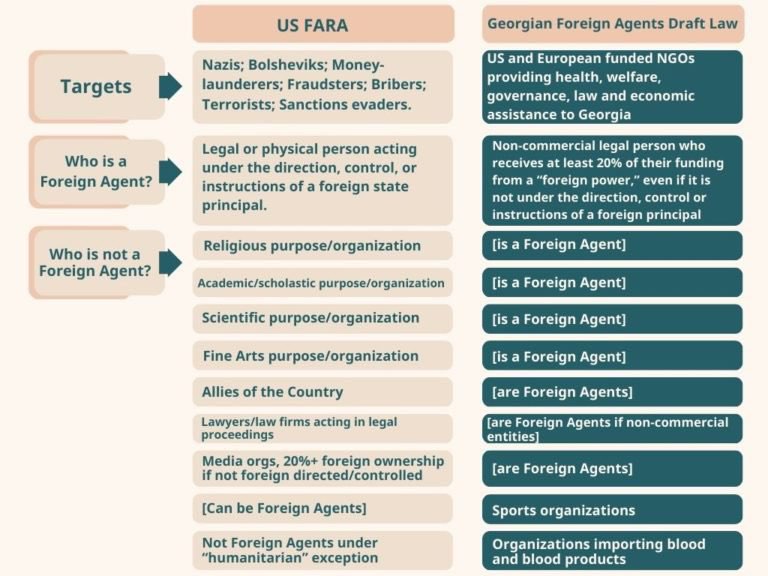
The problem of demonizing terminology and flipping friends and enemies
In theory, since the law does not distinguish between friends and enemies, it could apply to Russian-funded organizations as well. However, every law is implemented through the existing political context. The Georgian Dream government of Georgia never criticizes Russia and has essentially declared war on the West. They would not expose Russian-funded organizations.
Moreover, Russia likely funds its satellites with illicit routes and actual cash anyway.
The word “agent” means a “spy” in the Georgian language, and in the Soviet legacy, a “spy” inherently means the enemy of the people. Thus, anyone receiving Western money is an agent=spy.
Georgians do not perceive the West as a colonizer, it is not a cultural shame to receive Western money. Quite the opposite, actually. But the Georgian Dream is now flipping friends and enemies. With their actions in practice, such as smear campaigns against CSOs, they only prove it further.
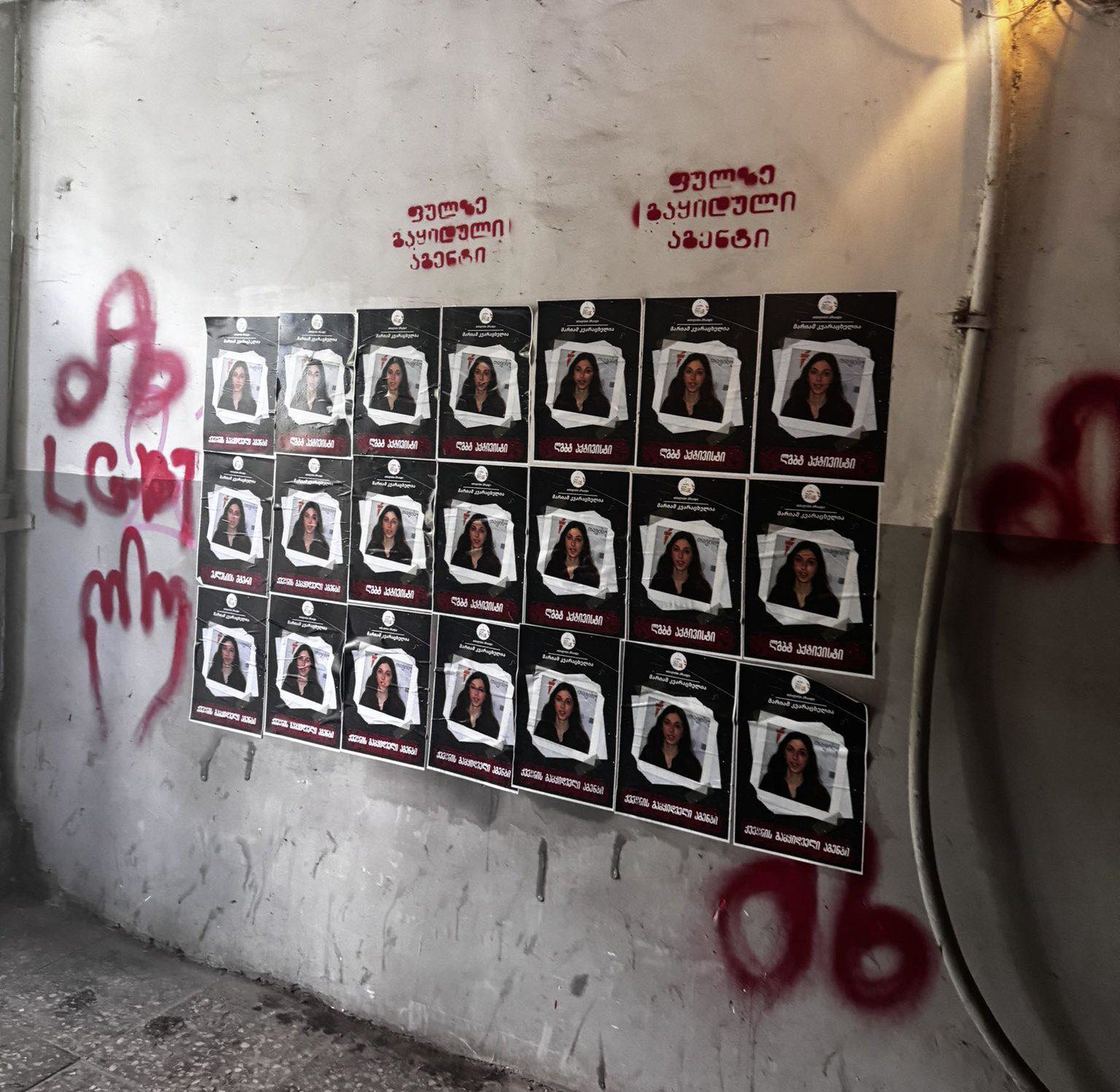
Even the Ombudsman of Georgia, Levan Ioseliani, who is from a party that has often been accused of being soft on the Georgian Dream, stated that the NGOs are transparent as they are and that there is no need for this legislation. Indeed, state agencies are aware of NGO funds through rigorous reporting that the organizations already have to provide.
Why the law opens the door for repressing civil society
There are four criteria of the law that ensure it will be abused to repress all undesirable organizations, which have been analyzed well by Hans Gutbrod.
- Excessive range
- Sweeping definition of a “foreign power”
- Lots of opportunities for arbitrariness
- Punitive fines.
The wide range of the law extends it to each and every single non-commercial NGO in the country other than sports and blood-importing organizations. This means that the law is as much about major NGOs such as Transparency International – Georgia and the Open Society Foundation as it is about any animal shelter, shelters for single mothers, organizations working with children with disabilities, etc. Even funding from individual foreign citizens and unidentified out-of-country sources would qualify you as a foreign agent.
So, an animal shelter that receives anonymous donations from individual citizens of the US/EU is a foreign agent=spy=an enemy of the nation.
Gutbrod writes:
“There are multiple ‘defects’ that can be found. Who decides when an application is ‘complete and correct’? You can’t name the people that bought 600 GEL of your knitted socks? There you go, you did not comply.”
Fines implied by the law are also debilitating for NGOs and would be applied even at the tiniest mistake or breach in making a declaration. With its scope, it is clearly punitive with the eventual aim of financially freezing an organization.
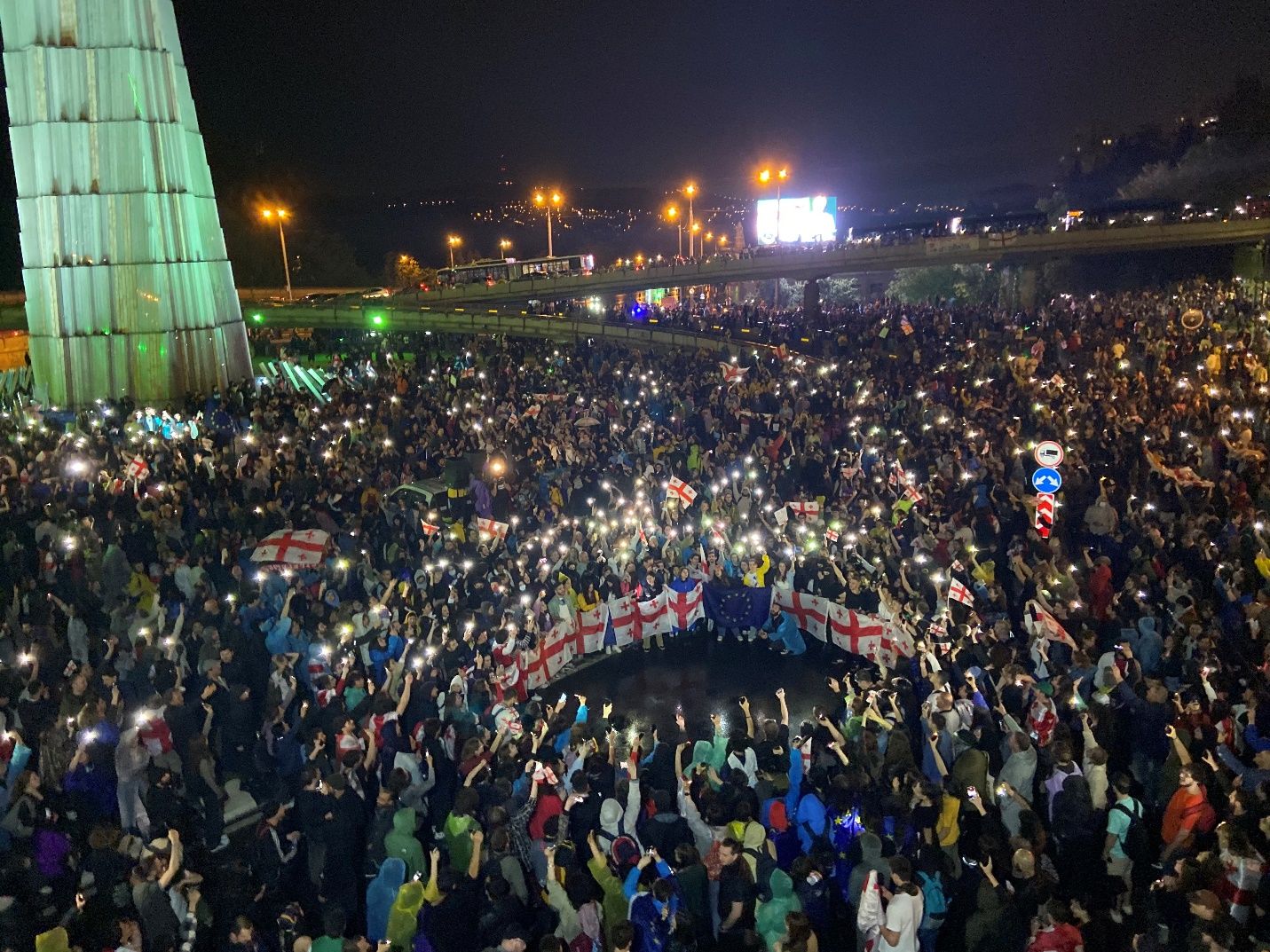
The importance of NGOs in Georgia and the impossibility of getting local funds
Julie George writes: “The thing is, what many CSOs in Georgia do is governance that the government does not,” and refers to the example of services concerning children with disabilities.
It is virtually impossible for CSOs to function on local funding.
Swedish journalist Rasmus Canbäck, who covers Georgian protests extensively, wrote that he met a lady who had asked three consecutive governments to aid her in getting funds for her NGO, but they were uninterested. Now, she is to be a foreign agent.
This is not an individual case. There is a profound lack of interest on the part of the Georgian Dream government to have NGOs in the country at all (as they are a tool for a Western-imposed coup, right?). In addition, there is no money in the country that would not be vulnerable to state pressure. The only Georgian person who is wealthy beyond petty intimidations is the oligarch Ivanishvili himself.
Thus, any non-government-affiliated community work in Georgia heavily depends on Western money. And the Georgian Dream knows it.
Secretly made amendments before the third vote that extend the law onto individuals – and their sex lives
There were three parliamentary votes on the law. President Salome Zourabichvili, who is the only independent institution now (arguably with the addition of the Ombudsman), vetoed the law. Since she did not give any comments and recommendations, the Parliament can now either shelve it indefinitely, vote the law down, or adopt the current version, which opens the way for international sanctions against them.
There had been some talks of “softening” the law, but the President did not give the Georgian Dream the opportunity to trick the public and the foreign partners and cornered the Georgian Dream into either backtracking or taking full responsibility for the consequences. The Parliament vowed to override the veto on 28 May. Unfortunately, they only need a simple majority to do so. There is heavy pressure from the US and the EU not to override it.
Before the third vote, they secretly/quietly amended the draft text.
The new text is as arbitrary as ever, and states that authorized officials of the Ministry of Justice may request personal data, including most types of confidential data (except secrets as prescribed by law) from “all persons, bodies, organizations, and entities.”
Failure to provide such information results in a fine equal to GEL 5,000 (approximately $1,800, an insane sum for Georgia, where most people do not earn even GEL 1,000 a month). The previous version of the law foresaw no penalties on individuals. Under the general legal definition of “data of special category,” the law also implies information on one’s sex life.
Notably, there is no real limit on imposing the fines, and court procedure over the lawfulness of its imposition does not free a person from the obligation to pay it. It is thus likely that the government will arbitrarily impose heavy fines on people to the point that their financial activities in Georgia become impossible, and they essentially need to leave the country.
How the Foreign Agents law proceeded in Russia
In Georgia, everyone understands that the law against organizations is just the first step – and individuals were already added to its scope from the first hearing until the third vote.
Because this is how it proceeded in Russia.
First, in 2012, they labeled organizations “foreign agents.”
Over the next 12 years:
- violating very strict laws on assemblies and manifestations became a criminal liability;
- cooperation with international foundations that were deemed “undesirable organizations” became a criminal liability;
- the law encompassed media and began labeling them as foreign agents as well, requiring from them to display the term on every piece they produce;
- it then extended onto everyone, even bloggers, who receive any amount of money from foreigners;
- in 2024, persons labeled as foreign agents were banned from running in elections as candidates.
Foreign Agents law as a tool to mark the territory of Russian influence
The following countries recently adopted or are now considering the adoption of various versions of the Foreign Agents law:
- Georgia
- Kyrgyzstan
- Hungary
- Slovakia
- Serbia
- the pro-Russian, Serb separatist entity in Bosnia and Herzegovina, Republika Srpska.
All these countries have one thing in common: governments that sympathize with Russia. The adoption process was also nearly simultaneous. This cannot be a coincidence. Russia is marking its territory of influence by suffocating civic freedoms. It also seems in a rush to do so.
Likely, Russia needs a victory somewhere, because that is not happening in Ukraine.
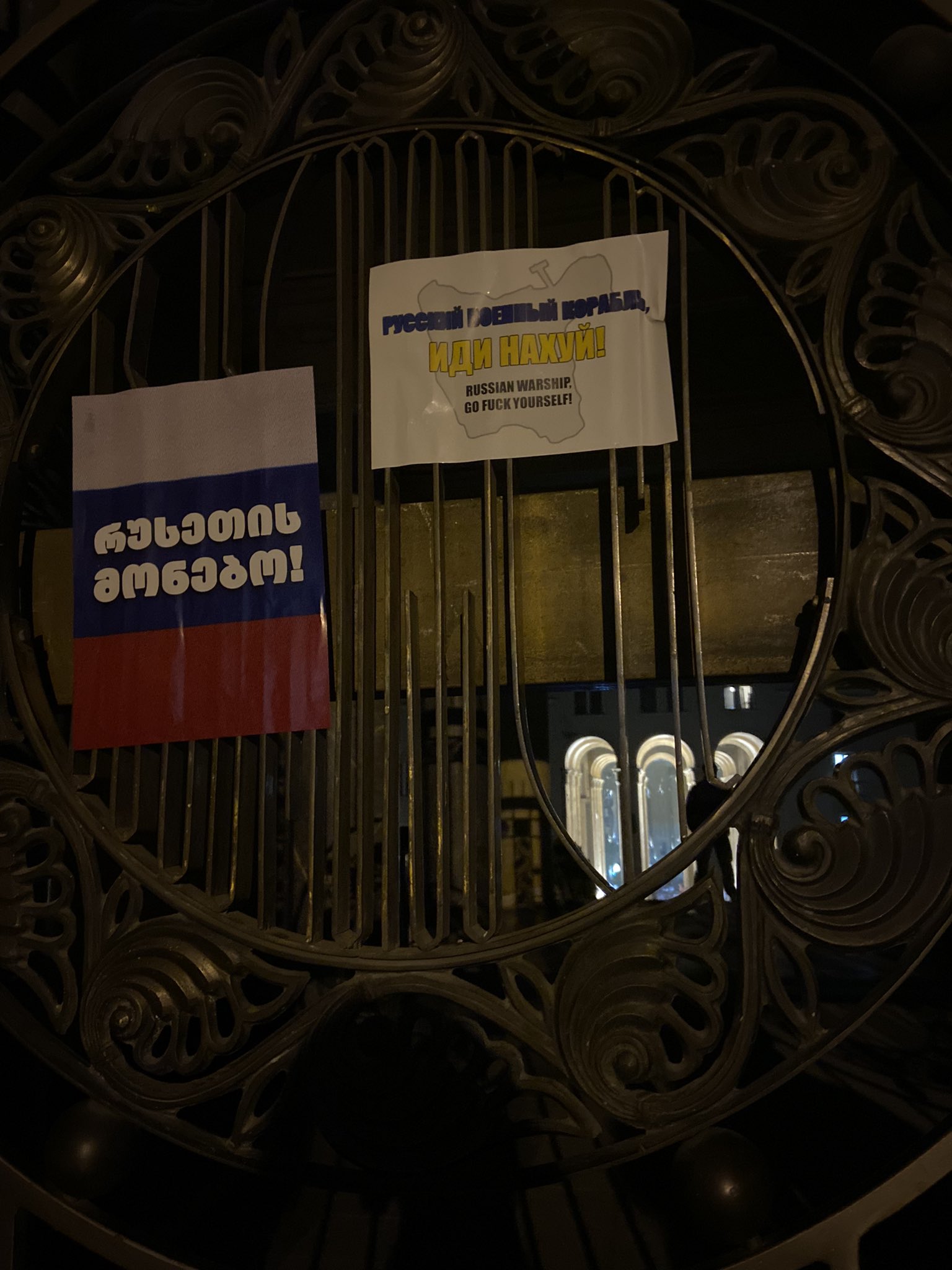
Georgia – the main frontline of the fight for civic liberties that we cannot afford to fail
With unprecedented protests in Georgia and Western sympathies, now even concrete steps by the United States in support of the people of Georgia, stakes are extremely high in Georgia.
I know from at least two professionals in friendly states that their governments view Serbia’s talks on the introduction of the law as Russia’s attempts to divert Western attention from Georgia to lift some pressure from the Georgian Dream government, as Russia now sees Georgia as the main frontline of its assault on civil liberties around the globe.
We can be sure that other tyrannies are also watching closely. If, despite everything, Georgia fails to defeat the Russian regime and Russian influences, it is very likely that we witness a series of Foreign Agents laws and other anti-democratic measures in more and more nations in transit, and maybe even beyond. Without getting deeper into national contexts, would it be impossible for such actions to gain momentum in, say, Montenegro or North Macedonia?
Russia knows it has no chance of bringing its government in Georgia if and when the Georgian Dream is unseated – there is no social and cultural foothold for Russia in Georgia of that scale, and electoral laws now do not disproportionately favor simply largest parties anymore.
The tyranny in the world sees Georgia as the main ground to spread the menace further. So must freedom in the world see it as such, and act accordingly.
Related:
- From Rose Revolution to “Russian Dream”: Georgia at breaking point with pivotal pro-EU protests
- “Story of a dying empire”: Georgia’s “foreign agent” law protests echo Ukraine’s Euromaidan
- What Surkov’s hacked emails tell about Russia’s hybrid war against Ukraine
Editor’s note. The opinions expressed in our Opinion section belong to their authors. Euromaidan Press’ editorial team may or may not share them.
Submit an opinion to Euromaidan Press



